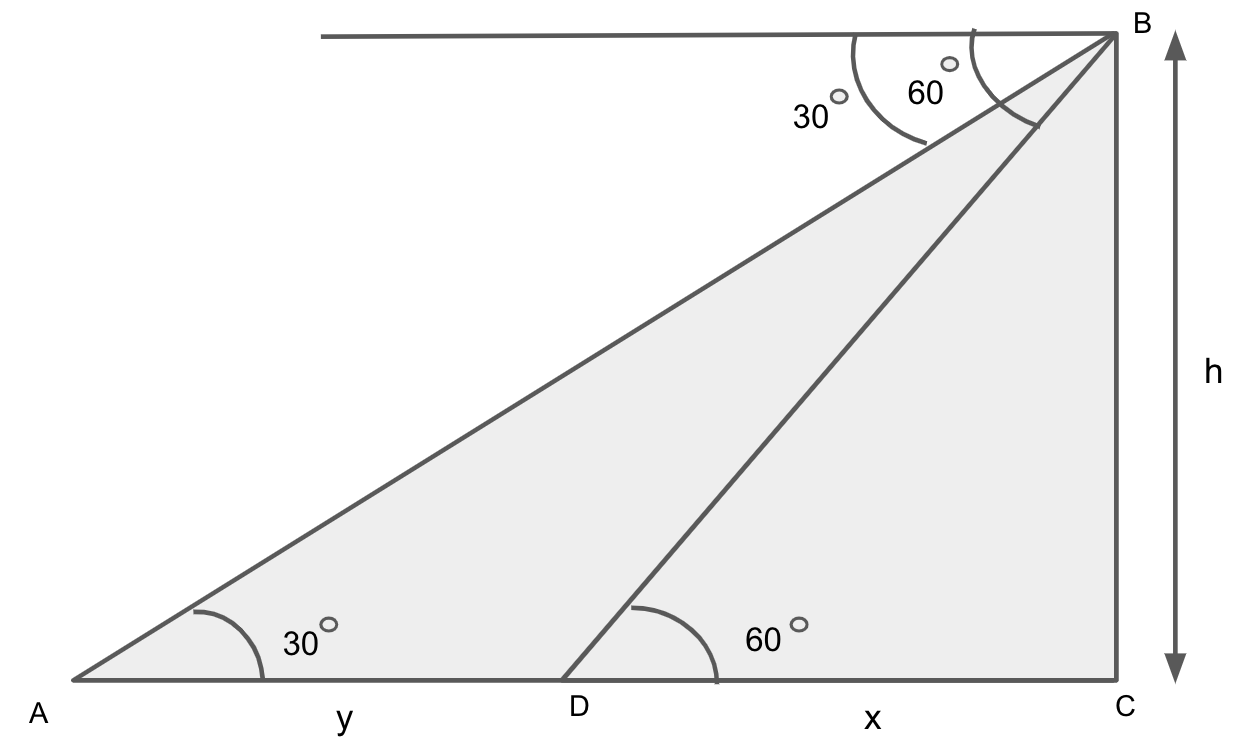Question
Question: A straight highway leads to the foot of a tower. A man standing at the top of the tower observes a c...
A straight highway leads to the foot of a tower. A man standing at the top of the tower observes a car at an angle of depression of 30∘, which is approaching the foot of the tower with a uniform speed. Six seconds later, the angle of depression of the car is found to be 60∘. Find the time taken by the car to reach the foot of the tower from this point.
Solution
Here, we will first draw the triangle using the given conditions to simplify the calculation. Then use the tangential property, that is, tanA=bp, where p is the perpendicular and b is the base. Apply this property, and then use the given conditions to find the required value.
Complete step by step answer:
Let us assume that the height of the tower is h and x and y are the distance of two points from the tower.
We are given that the time taken to cover the y distance is 6 seconds.
First, we will draw the triangle using the given conditions.

First, we will take the triangle ΔABC.
We will use the tangential property, that is, tanA=bp, where p is the perpendicular and b is the base.
Using the above tangential property, we get
tan30∘=ACBC
Substituting the values of the length AC and BC in the above equation, we get
⇒tan30∘=x+yh ⇒31=x+yhCross-multiplying the above equation, we get
⇒x+y=3h ......eq.(1)
We will now take the triangle ΔBCD,
We will use the tangential property, that is, tanA=bp, where p is the perpendicular and b is the base.
Using the above tangential property, we get
tan60∘=CDBC
Substituting the values of the length BC and CD in the above equation, we get
⇒tan60∘=xh ⇒3=xhCross-multiplying the above equation, we get
3x=h ......eq.(2)
Using the equation (2) in the equation (1), we get
⇒x+y=3(3x) ⇒x+y=3xSubtracting the above equation by x on both sides, we get
⇒x+y−x=3x−x ⇒y=2x .......eq.(3)We know that the formula to find the speed is td, where d is the distance and t is the time.
We also know that if speed is uniform than the speed to cover the distance x is equal to the speed to cover the distance x+y from the given diagram.
Then we have that the speed tx, where x is the distance and t is the time in the triangle BCD is equal to the speed 6+tx+y, where x+y is the distance and t+6 is the time in the triangle in the triangle ABC, we get
⇒tx=6+tx+y
Cross-multiplying the above equation, we get
⇒(6+t)x=t(x+y) ⇒6x+tx=tx+tyUsing the equation (3) in the above equation, we get
⇒6x+tx=tx+t(2x) ⇒6x+tx=tx+2tx ⇒6x+tx=3txSubtracting the above equation by tx on both sides, we get
⇒6x+tx−tx=3tx−tx ⇒6x=2txDividing the above equation by 2x on each side, we get
⇒2x6x=2x3tx ⇒3=t ⇒t=3Therefore, the time to cover x distance is 3 seconds.
Note: In solving these types of questions, you should be familiar with the concept of angle of depression and the tangential properties. Students should make the diagram for better understanding. Using the values of respective angles you can simply find any length present in the figure using the tangential value ‘tan’, which makes our problem easy to solve.
